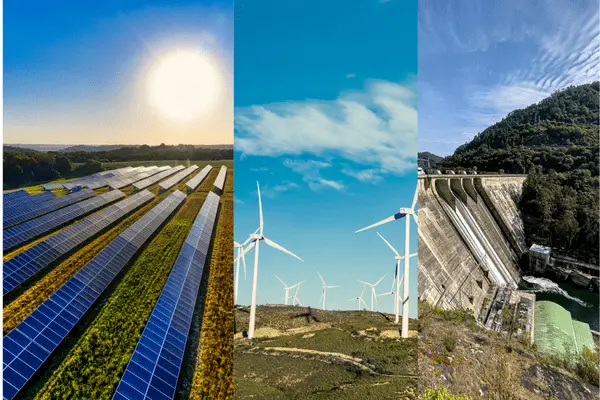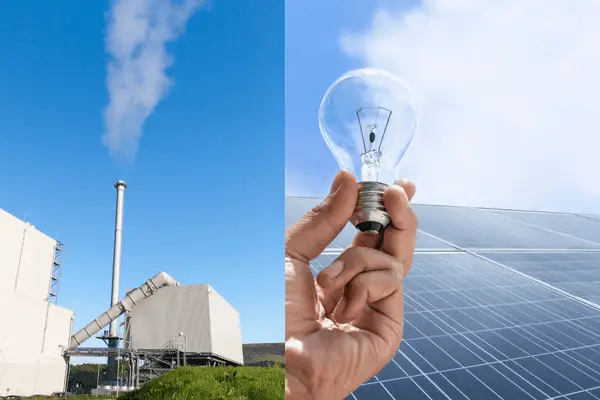Biomass is undoubtedly one of the most used renewable energy sources today, tracing its origin back when man began using wood for cooking and keeping warm.
Experts consider this organic energy infinite since it comes from plant materials and animal waste that can quickly regrow to replace the used resources.
As much as biomass is a renewable and versatile energy source, it can become non-renewable if we don’t replace existing feedstock as quickly as we use them.
Moreover, biomass is not 100% clean and can encourage deforestation since its primary resource is wood.
For these reasons, it is necessary to search for biomass alternatives to help preserve natural resources.
Can Biomass Energy Be Replaced?
Biomass energy is replaceable with other renewable energy sources such as solar, wind, geothermal, and hydroelectricity.
Biomass is relatively expensive as it requires large volumes of feedstock to achieve high energy yields
The only notable advantage biomass has over other renewable energy sources is its availability. As you may already know, biomass is largely and widely available across the globe.
Besides, biomass is the only renewable energy source that contains stored energy, meaning you can convert biomass to electricity or store biomass for later usage.
What Is The Alternative For Biomass?
Biomass has several alternatives, including solar, wind, geothermal, tidal, hydrogen, and hydroelectricity energy.
All the above-mentioned biomass alternatives are renewable energy sources, meaning they come from resources that cannot run out and are naturally replenished within a short time.
Other biomass alternatives come from fossil fuels such as coal, crude oil, petroleum, and natural gas.
Fossil fuels are non-renewable energy sources, meaning they get depleted and take millions of years to form again.
Learn more: Depletion Of Nonrenewable Resources: Causes, Effect & Solution
What Is Wrong With Biomass Energy?
Despite being one of the most used renewable energy sources, biomass is not as clean as previously thought. It emits carbon and other gases that can be harmful to the environment.
Biomass also encourages deforestation since it comes primarily from wood, vegetation, and plants.
Is Biomass Renewable Or Alternative?
Biomass is both a renewable and alternative energy source. After all, renewable energy is another term for alternative energy.
Biomass is a renewable energy source since it comes from plants, vegetation, and animal waste that naturally regrow and cannot run out.
Moreover, it’s an alternative energy because it doesn’t use fossil fuels like coal, crude oil, and natural gas.
All energy forms that naturally regrow but are not used as the primary source of energy are classified as renewable and alternative energy sources.
What Is The Best Source Of Biomass?
The best source of biomass depends on the type of energy you intend to produce.
For instance, the best source for biofuels include grains, sugarcane, sugar beets, sweet potatoes, wheat, rice straws, and other agricultural residues.
The best source of biomass for power include municipal solid waste, paper mill residue, and lumber mill scrap.
Wood remains the largest source of biomass energy since it is readily and widely available compared to other resources.
Besides, wood only requires direct combustion to produce energy for cooking, heating, and industrial purposes.
Is Biomass Better Than Solar Energy?
Biomass is possibly better than solar energy since it is readily and widely available compared to the latter, which is not always present.
You have to tap solar energy from the sun using panels before using it, while we can use biomass through direct combustion without going through complex processes.
Moreover, we can convert biomass into various fuels and gases used for transportation, heating, cooking, and industrial purposes, while we cannot convert solar energy into liquid or gas fuels.
We can also obtain biomass from various sources ranging from wood to agricultural products, while solar energy only relies on the sun.
Solar is only better than biomass in energy conversion efficiency, standing at 30% compared to biomass which is at 10%.
Is Biomass Better Than Oil?
Biomass is better than oil since it is a renewable and sustainable energy source.
Moreover, since biomass is carbon-neutral, it lowers greenhouse gas emissions, while oil use and extraction has a devastating effect on the environment and natural habitats.
Biomass also comes from natural sources such as plants and animal waste that don’t diminish and regrow quickly, unlike oil that cannot be replenished once used.
Above all, biomass is available locally compared to oil that countries have to import from oil-producing nations.
Is Biomass Really Renewable?
Experts consider biomass a renewable energy source since it obtains its inherent energy from the sun and regrows within a short time.
However, the renewability of biomass depends on how fast we replenish the used feedstocks and resources.
Biomass comes primarily from natural resources such as wood, plants, and vegetation.
Failure to regrow these plants once used might deplete biomass sources and make it somewhat non-renewable.
Is Biomass Good For Climate Change?
Biomass is good for climate change since it is carbon-neutral and helps reduce greenhouse gas emissions.
This natural organic energy source only releases carbon equal to the amount absorbed by plants, making it good for the environment.
It facilitates the continuous carbon exchange between the biosphere and the atmosphere, making biomass ideal for climate change mitigation.
On the flipside, biomass can encourage deforestation, which might have an adverse impact on the environment and contribute to climate change.
Therefore, it’s vital to replenish used biomass as soon as possible to avert negative effects.
How Can Biomass Energy Be Improved?
We can improve biomass by avoiding direct combustion since it leads to wastage and energy loss.
Other ways to improve the efficiency of biomass energy include:
- Using waste biomass from food and agricultural residue
- Using improved cookstoves to burn biofuels more efficiently
- Improving ventilation in households to avoid air pollution
Final Thoughts
Biomass remains one of the most important energy sources in the world today.
Apart from reducing over-reliance on fossil fuels, biomass is renewable, carbon-neutral, and readily and widely available.
Despite the numerous benefits and applications, biomass has its fair share of shortcomings.
So, it’s logical to look for biomass alternatives to address and overcome the challenges associated with this organic energy source.



